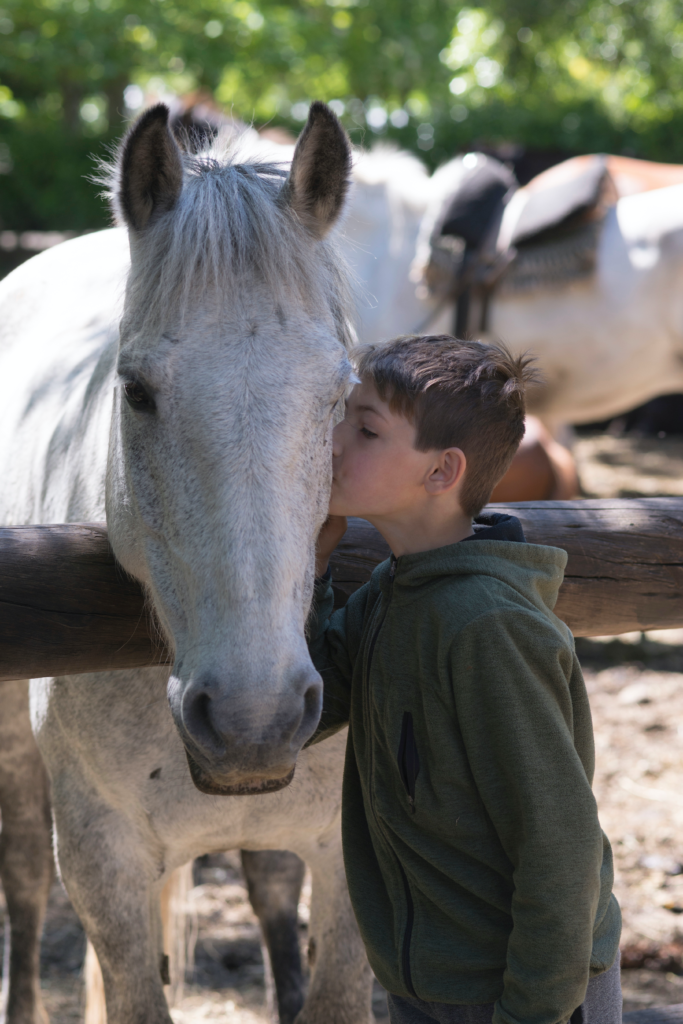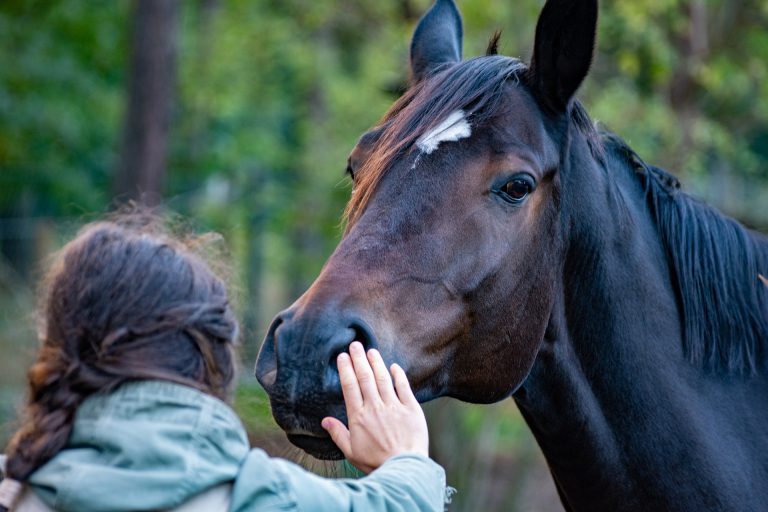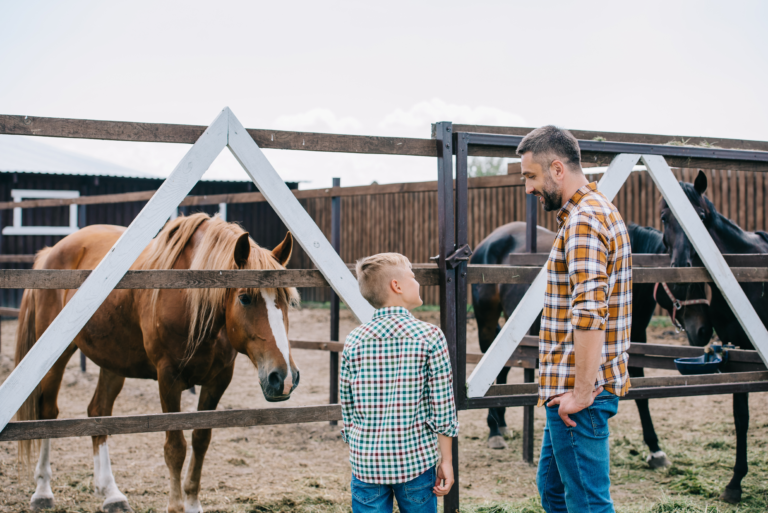EAMH Clinical Program
About
EAMH Treatment for Stability and Wellness Clinical Program
Eudaemonia Equine Connections, Inc.®’s Equine-Assisted Mental health (EAMH) Treatment for Stability and Wellness Clinical Program is a behavioral health program offering outpatient psychotherapy for individuals, couples, and groups.
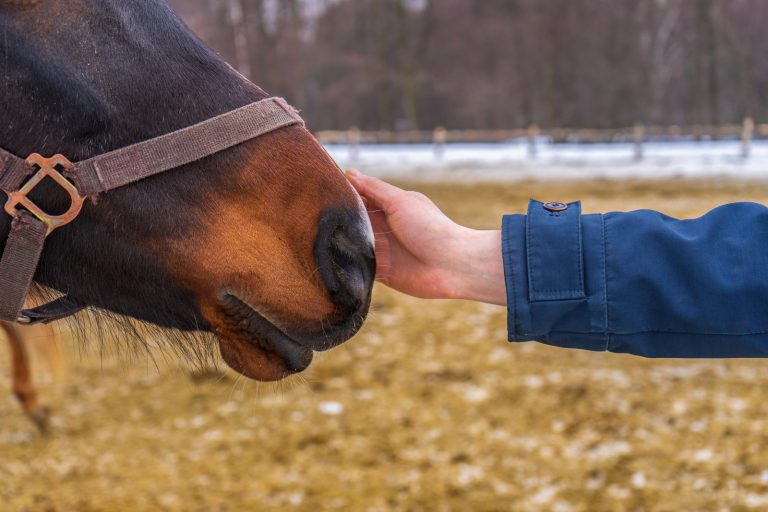
Why Equines?
Equines in EAMH may include horses, miniature horses, mules, donkeys, and miniature donkeys. The terms equine and horse are used interchangeably to indicate the type of animal that is used in this form of behavioral health treatment.
Horses both have consciousness and sentience, and are capable of autonomy, intention, agency, emotions, memory, cognition, perception, fear, and pain. Their ability to attune and accurately read humans makes them remarkable in the work of psychotherapy. In addition, horses are social animals who thrive with partnership and connection with their own species, at times with other animals, and are able to transfer their wiring for inner species connection with humans in a cross-species, nonverbal relationship and develop a horse-human bond.
Equines are ungulate (hoofed) land mammals that include horses (Equus ferus caballus), mules, donkeys, zebras, and asses. They evolved 60 million years ago, and the modern Equus ferus caballus has been relatively unchanged for past 3.5 million years. The co-existence of both equines and humans began approximately 30,000 years ago to present, and it was not until about 4300 B.C. that their co-existence changed from hunter and the hunted and evolved to include domestication and kinship.
Despite thousands of years of domestication and selective breeding, horses are very much still connected to their fight-flight survival responses and are prey animals that were born to run from predators. These autonomic nervous system responses make them extremely hyper-sensitive and hyper-aware of their environment surroundings. They have advanced sensory acuity in all five major senses and strong reactivity responses, also known as “spooking” to perceived threats. These natural behaviors make horses very attuned to humans as sources of safety and connection, or threat, and can pick up on human body language and facial expressions, vocal tone, emotions, energy level, and scent.

The horse-human bond complements well with EAMH treatment because psychotherapy relies on relationship and connection with therapist and client in order for trust and courage to do the often-difficult work that counseling entails. Horse-client relationship is encouraged to develop with the use of feedback provided by the horse, and aid to enhance the therapeutic process and help bring unconscious thoughts, feelings, and responses and facilitation of present moment awareness.
EAMH is all about learning how to communicate, interact, and connect with horses directly and indirectly during psychotherapy work. Horses are beautiful and novel creatures that may help reduce stigma of psychotherapy, reduce barriers of those who do not do well or do not want to participate in office-based therapy. In turn, they may help to normalize the therapy process through in-person physical interaction and presence with horses.
There is growing consensus that horses are capable of being sources of profound healing potential for humans who are suffering from emotional and spiritual pain. Thousands of tautological accounts from around the world from practitioners and patients attest to horses being incredible additions to therapeutic recovery and healing process. How they are is still under scientific inquiry and there are an abundance of theories to try to explain the phenomena.


Clinical Services Provided
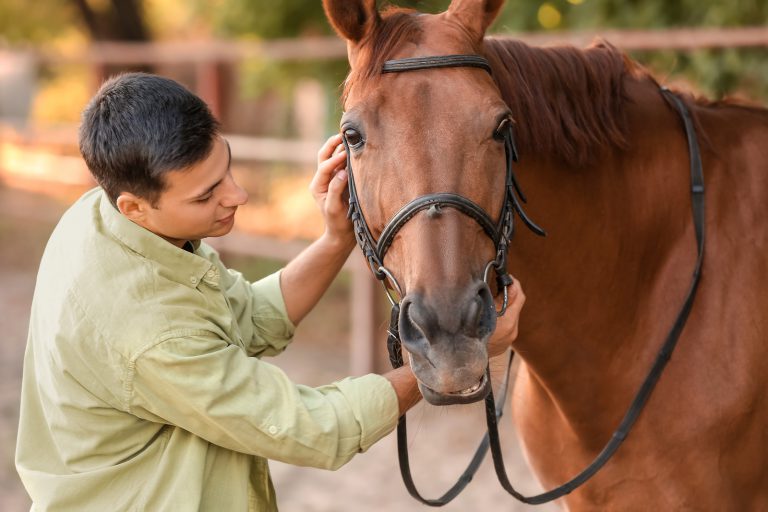
- EAMH clinical psychotherapy interventions provided include psychosocial techniques (interpersonal interaction, learning experiences, role playing practice, relationship building, and coping skills) to reduce distress, maladaptive behavior, and psychological and psychiatric problems and to enhance adaptive functioning and positive experiences in everyday life.
- Strong focus on present-moment awareness, experiential learning, and the integration of the mind-body-spirit connection.
- Way to work in relationship building
- Real-time learning through experience
Units of Treatment
Couples
Groups
Modalities
Evidence-Based Practice (EBP) Incorporated in EAMH Services
Motivational interviewing
Strengths-based
MBSR
Seeking Safety
Psychosynthesis
Theories Applied
Transpersonal
Psychodynamic
Present Moment- Here and Now
Humanistic
Client-Centered
Ecotherapy
Gestalt
Experiential
Systems Theory
Existentialism
Choice and Reality
Treatment Area of Focus
Anxiety
Trauma/PTSD
Existential Crisis
Career Counseling
Self-Actualization/Self-Development
Transpersonal
Mindfulness/MBSR
Ecotherapy and Connection with Self and Nature
Authenticity
Interconnectivity, Relationships
EAMH Activities
Groundwork/Games
Mounted/Unmounted Sessions
Observation
Ecopsychology
Milieu
Barn Activities
Horse Feed and Care
Additional Activities Integrated Into EAMH Sessions May Include
Equine-Centered Events & Activities
Basic Horsemanship Skills and Riding Skills
Metaphor & Role of Equine
CLIENT FOCUS
- Adults 18+
- Children 7+
MODALITY
- Individuals
- Couples
- Groups
MENTAL HEALTH DIAGNOSES
- Mood Disorders
- Thinking Disorders
- Trauma-Stressor Related Disorders
SPECIALITIES
- Anxiety
- Depression
- Trauma
- Spirituality
- Animal-Assisted Therapy
- Equine-Facilitated Psychotherapy
ISSUES
- ADHD
- Adoption
- Anger Management
- Behavioral Issues
- Bipolar Disorder
- Career Counseling
- Chronic Illness
- Chronic Pain
- Codependency
- Coping Skills
- Divorce
- Family Conflict
- Grief
- Infidelity
- Life Coaching
- Life Transitions
- Marital and Premarital
- Parenting
- Peer Relationships
- Relationship Issues
- School Issues
- Self Esteem
- Self-Harming
- Sexual Abuse
- Stress
- Substance Use
- Suicidal Ideation
- Trauma and PTSD
- Women's Issues
TYPES OF THERAPY
- Animal Assisted Therapy
- Art Therapy
- Attachment-based
- Coaching
- Cognitive Behavioral (CBT)
- Compassion Focused
- Culturally Sensitive
- Equine-Facilitated Psychotherapy (EFP)
- Emotionally Focused
- Expressive Arts
- Family / Marital
- Integrative
- Interpersonal
- Mindfulness-Based (MBCT)
- Motivational Interviewing
- Narrative
- Person-Centered
- Positive Psychology
- Psychodynamic
- Relational
- Solution Focused Brief (SFBT)
- Strength-Based
- Transpersonal
- Trauma Focused
- Humanistic
- Gottman Method
- Family Systems
What To Expect In EAMH With Dr. Rebecca
My approach to working with you is gentle, non-judgmental, compassionate, and emotional and physical safety are my priority. I implement clinical interventions uniquely catered to your needs and outcome treatment goals.
After initial screening, intake, and assessing for “good fit” necessary for us to establish the foundation of our client-therapist relationship, then I will develop a client-centered, step-by-step treatment plan that will be based on your current presenting issues, safety and immediate needs, current baseline and level of readiness for psychotherapy treatment.
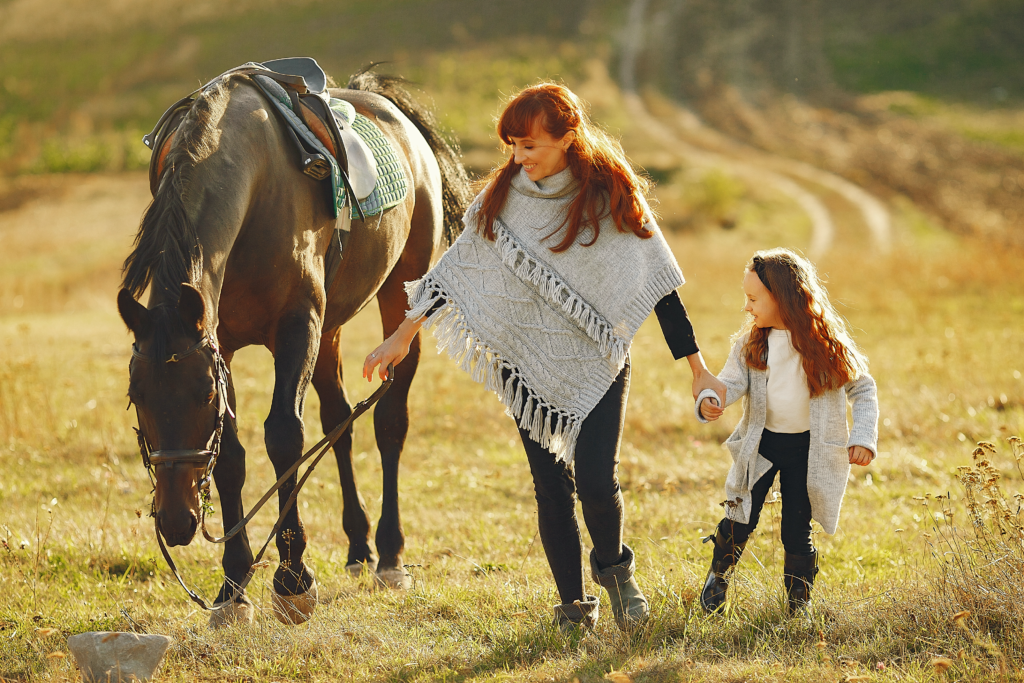
Meet Our Herd
Equine Therapy Partners
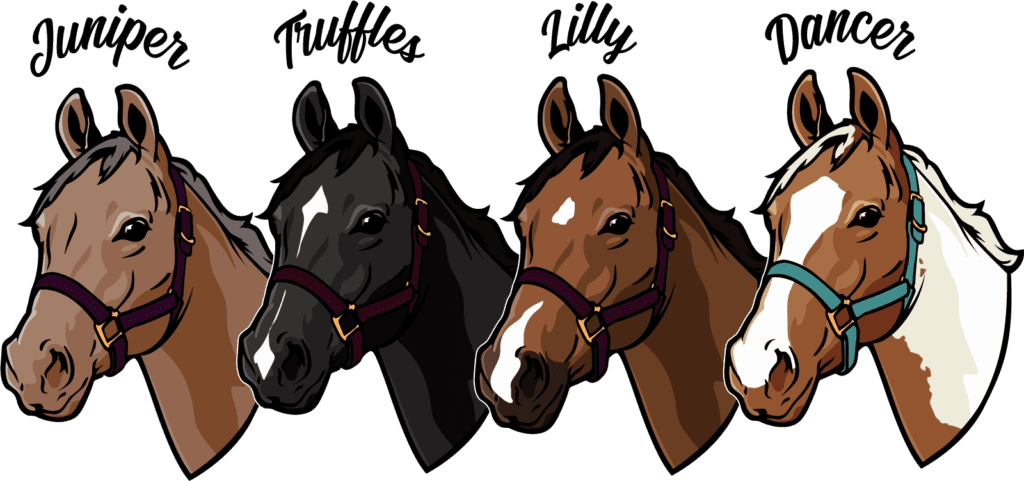
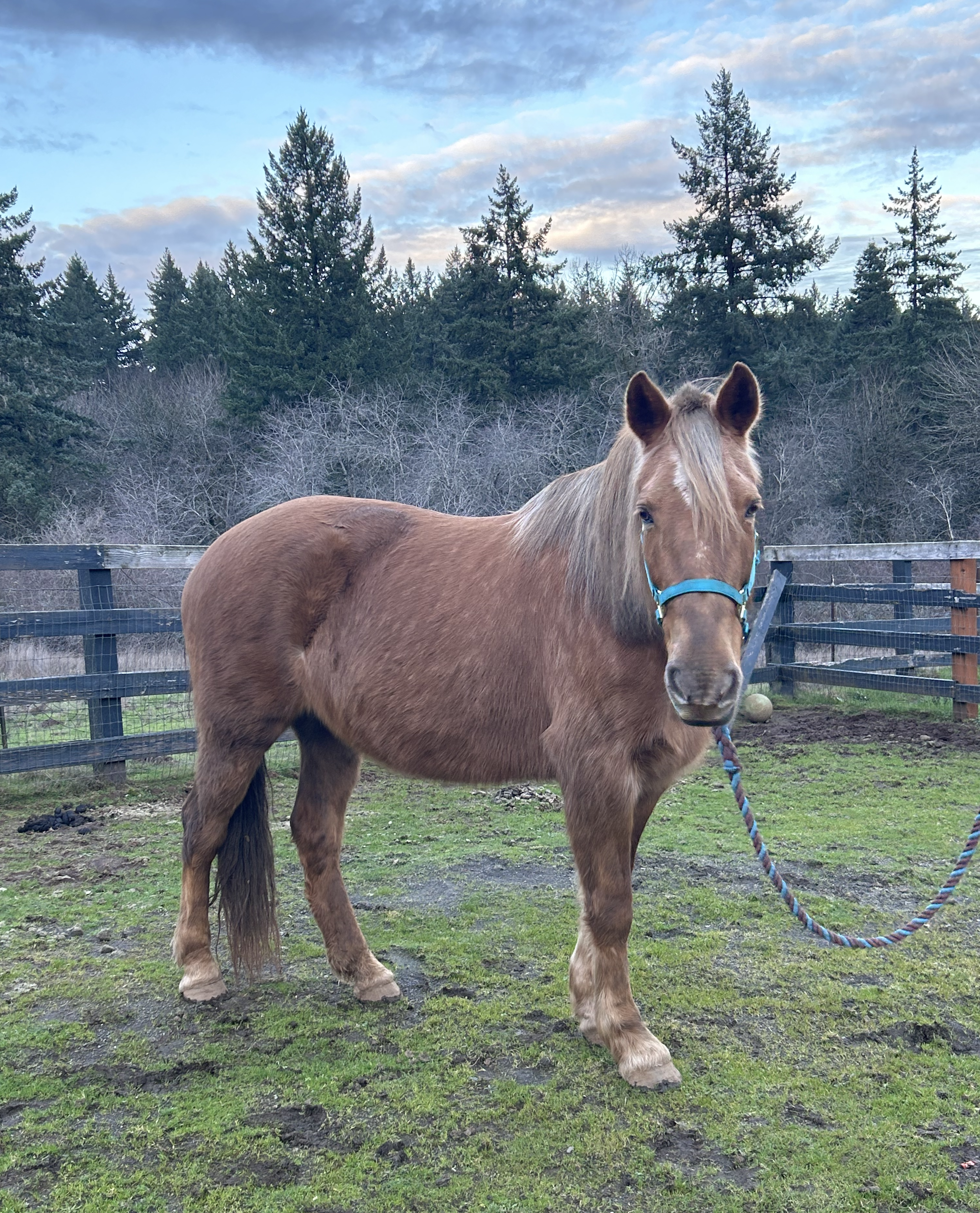
Autumn
Autumn is a 20-year-old Belgian-Quarter horse cross mare. She is our new and wonderful therapy horse, and started training in our in-person EAMH program in October 2023 and officially became a therapy horse in January 2024. Although “Autumn” is large in size she has a gentle, curious, and intelligent presence (a "gentle giantess"). She is charismatic and has officially become our barn greeter. She enjoys saying hello and meeting and interacting with people. With her sweet and affectionate personality and playful sass at times, as she is learning her new job, she enjoys connecting with people during sessions (especially when they give her treats!).
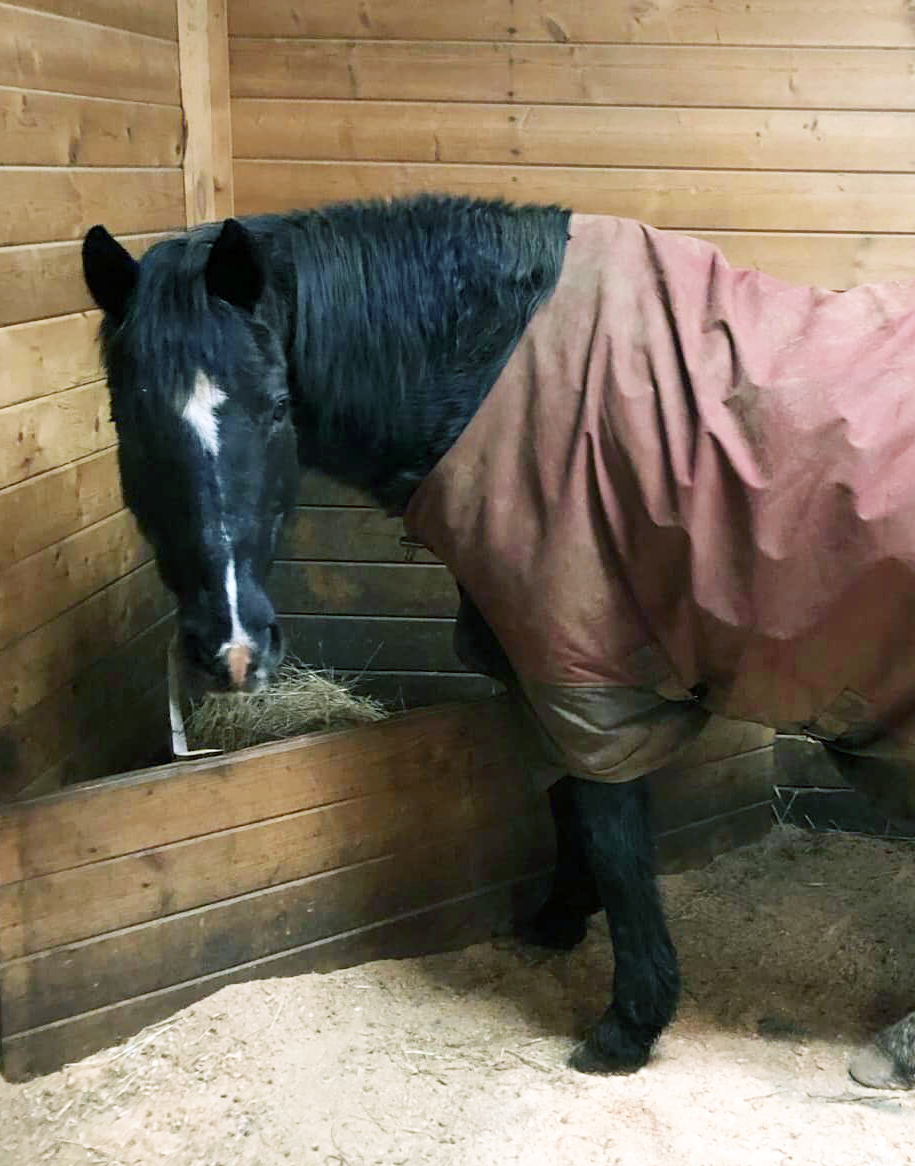
Truffles
Truffles is a 20+ year old Morgan-Quarter horse pony cross mare. She has a highly sensitive, intuitive, and sweet disposition. She loves affection and connecting with humans, however, she can be sensitive to human energies and can become reactive if she feels unsafe by moving her head away or shifting her body away. She does not have a scary spook and is well-mannered, kind, and affectionate. She is used in most EAMH activities spaces. Also, she can demonstrate a spunky personality when lunging. She is used in most EAMH activities spaces.
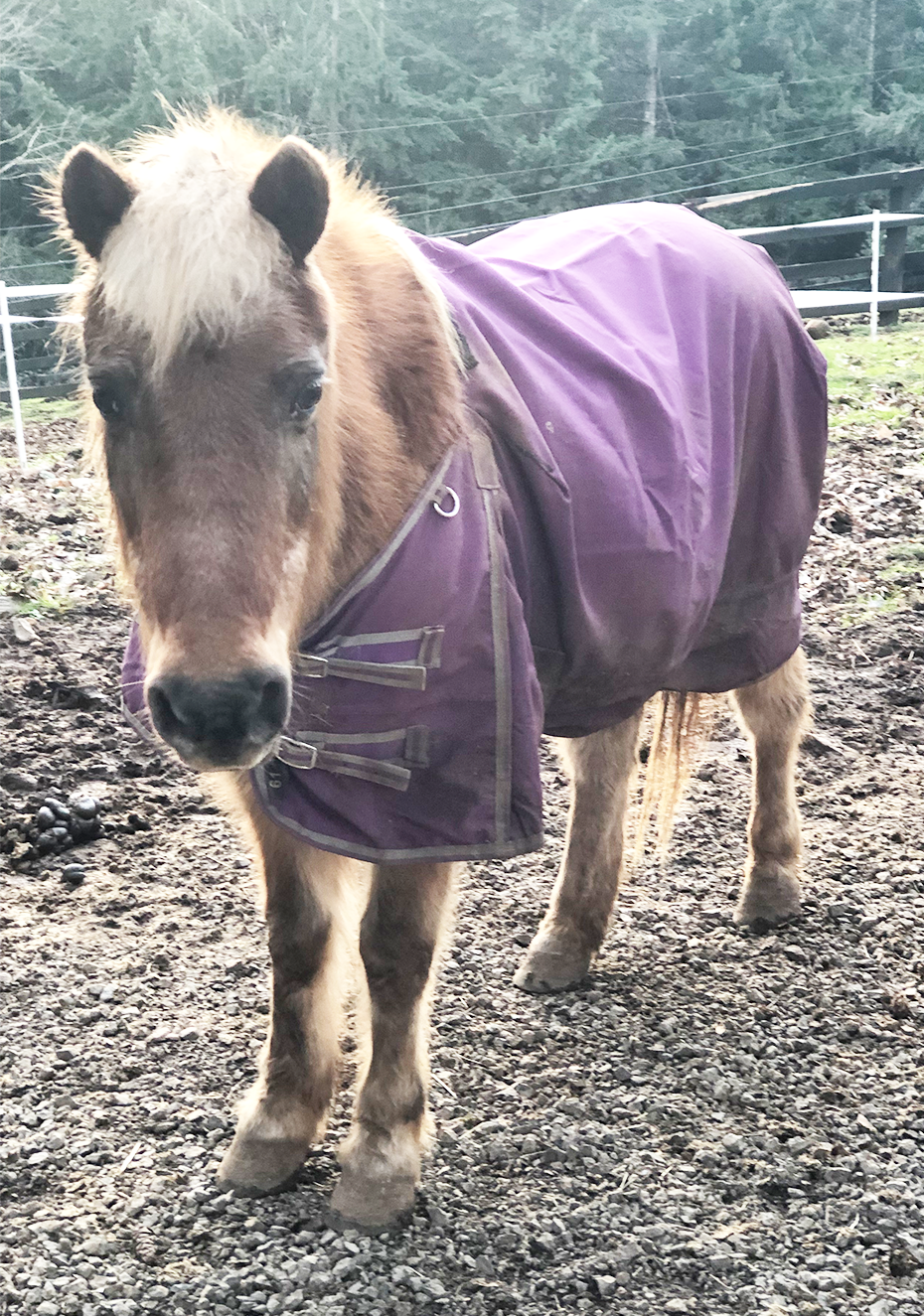
Juniper
Juniper is a 30+ year old Halflinger-Shetland Cross mare. In 2008, she was rescued by her current owner. She is sweet but not without her sass, and is wonderful with children.
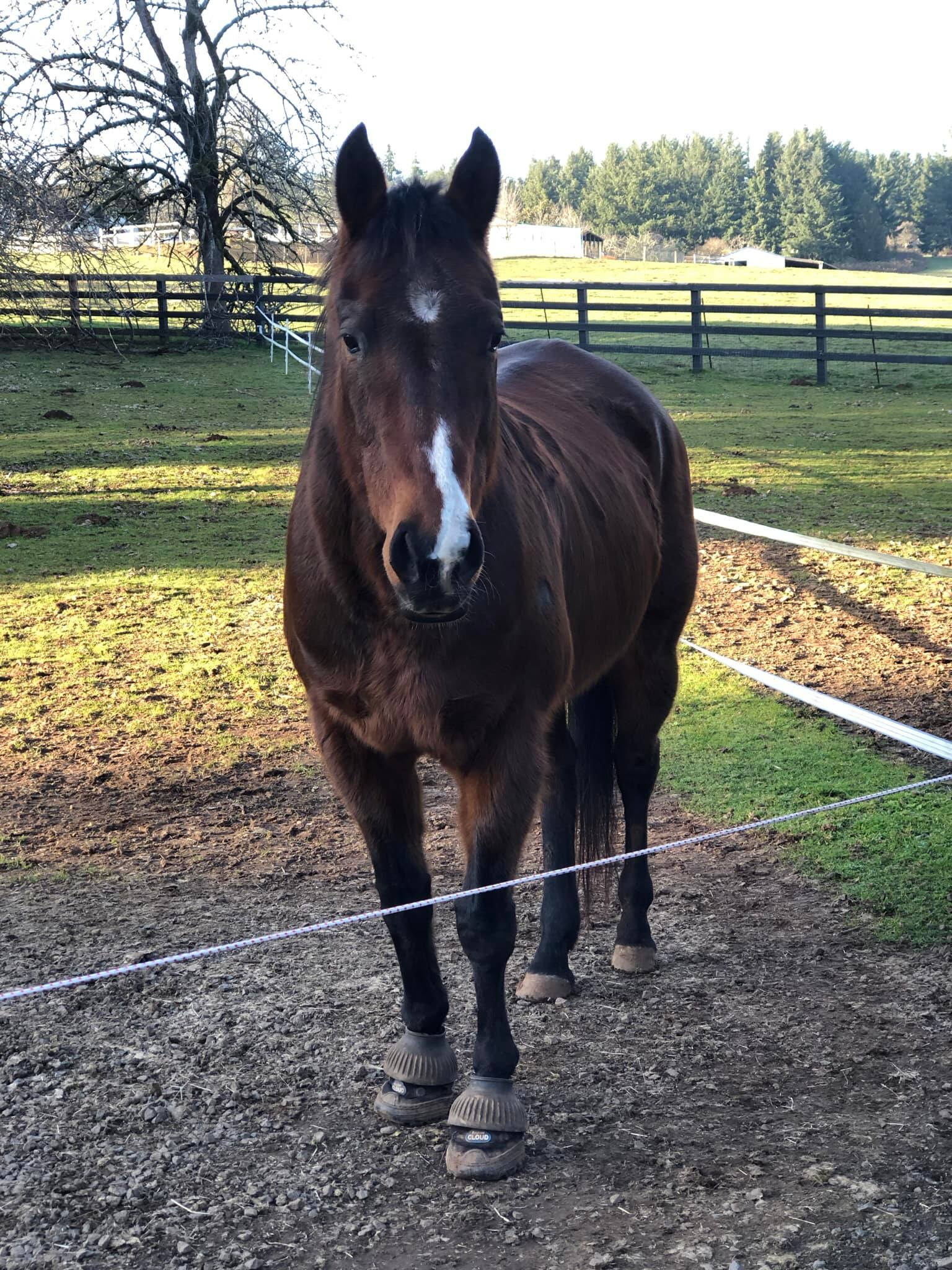
Lilly
Lilly is a 20+ year old Quarter horse mare. She has a sweet sensitive soul, calm and loving, and enjoys attention when she is in her pasture. At times, she can worry when changes occur in her environment or if she cannot see or be in proximity from her horse friends.
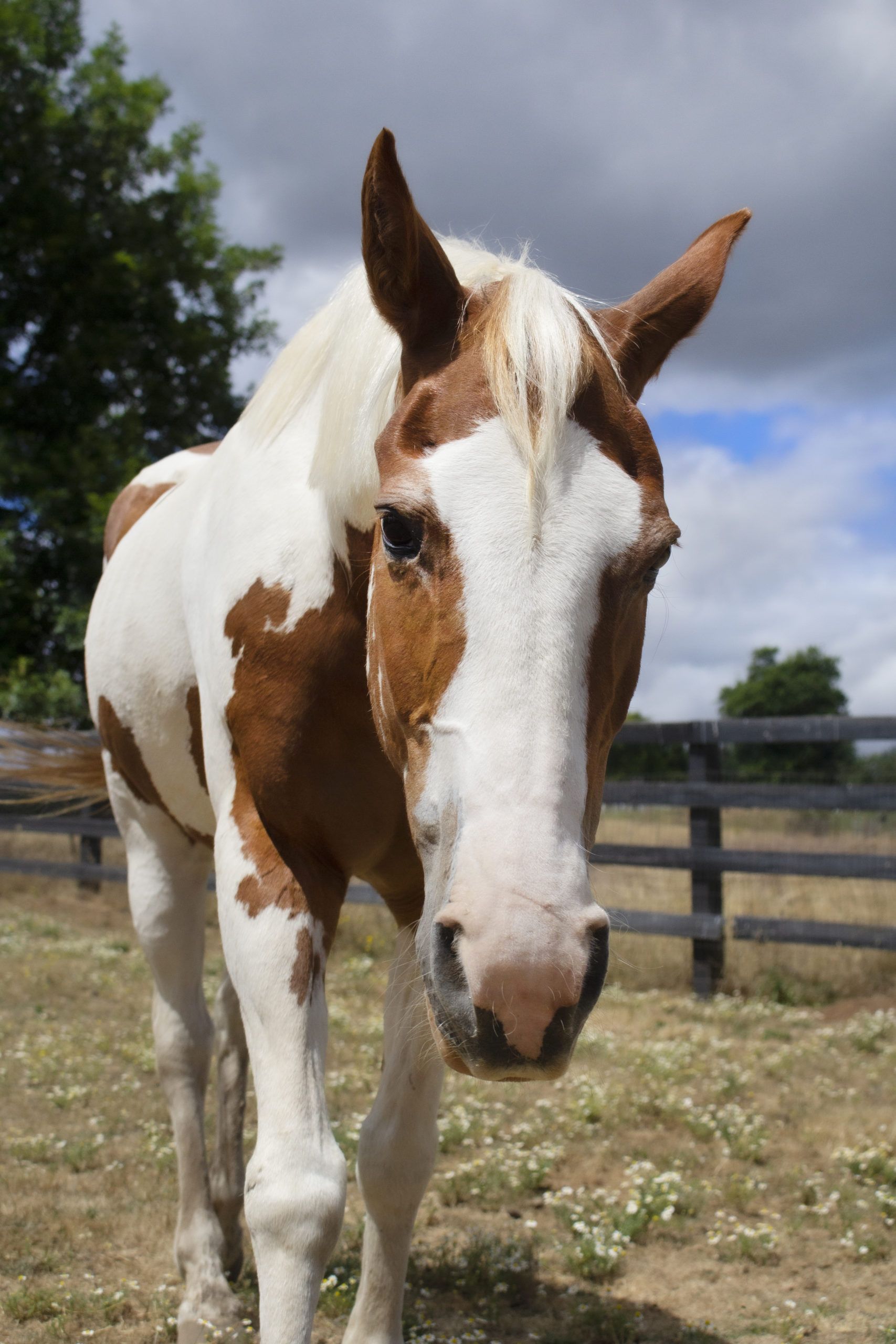
Dancer
Northern Dancer, "Dancer", was a 20+ year old American Paint Horse mare and was named in honor of the racehorse and is originally from the Stockton Livestock Company in Eastern Washington. She was a Camp Namanu camp horse from 2011 to 2020, and currently resides at Seahorse Farms in Sherwood, Oregon. She had a sweet, grounded, and calm equine sage personality who knew her job and stood quietly and politely during handling. Her calm, confident, and sweet disposition allowed her to be wonderful for beginner, anxious, or fearful clients. Although she was reliable and polite with humans, she could take a moment to warm up to a new person, and when she did, she became affectionate, curious, and engaging.
Due to severe arthritis and older age, she was laid to rest on October 13th, 2023.
- Currently, we have a lovely facility at a private barn located in Sherwood, OR and have 4 wonderful therapy horses (Juniper, Truffles, Lilly, and Autumn) who serve as our equine partners in EAMH sessions.
- We are in the process of carefully assessing and considering horses to lease, purchase, and/or receive donated for our clinical program.
- If you would like to donate your horse or sponsor purchase of a therapy horse (estimated price $1500 to $5000), please Contact Us!
- To Sponsor or Donate Contact Us!

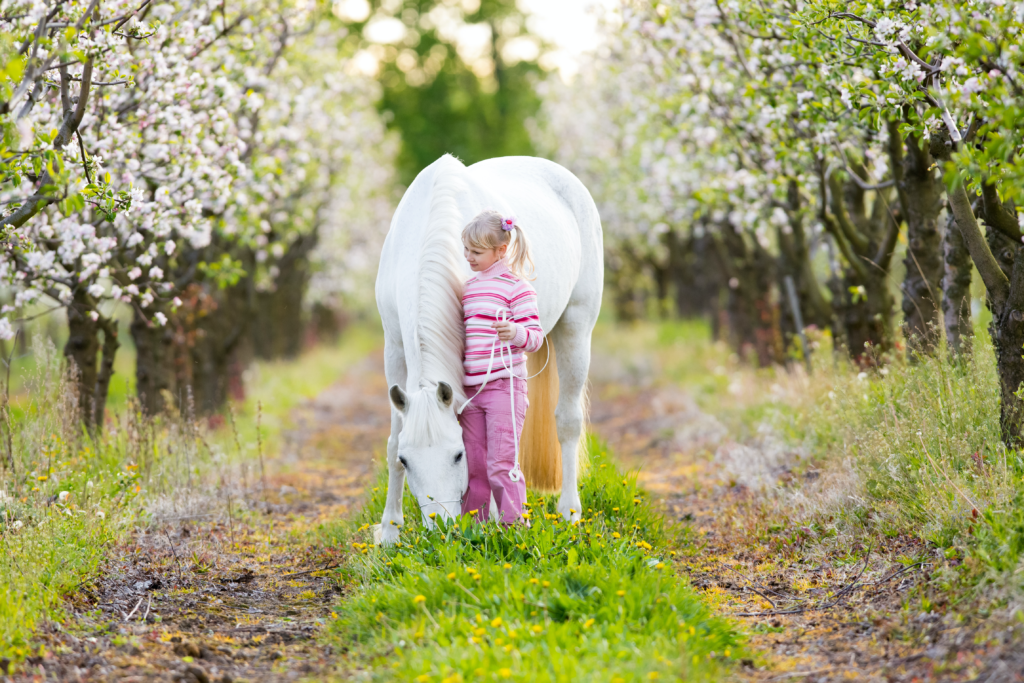
Considerations For Treatment Process
In EAMH, the role of the horse is often the determining factor in human change. However, for psychotherapy treatment to be successful requires an individual to be vulnerable, honest, have inner-awareness, to take responsibility, and to be co-participatory in their therapeutic process.
In addition, with time, patience, and willingness for an individual to work through defensive layers of pain and hurt can help reduce old maladaptive behaviors that are no longer working and create newer, healthier patterns of coping with trauma and adversity.
By re-programming old behaviors of negative thinking, such as cognitive distortions, and false narratives, such as dysfunctional core beliefs about oneself, from the past and working with the present to reintegrate new ways of existing greatly assist in reducing suffering and mental health symptomology. Ideally, these new behaviors may lead an individual to experience well-being, deeper growth and/or transpersonal shifts, and wholeness.
Confidentiality & Limits To
Confidentiality is the foundation that makes counseling safe and effective. Clinicians in direct client services are bound by federal and state law and ethics to ensure patient’s privacy and confidentiality, and value patient’s right to privacy and confidentiality to be an essential component of successful treatment. Anything discussed between therapist and patient will not be disclosed without prior knowledge and written approval with a written authorization release form (ROI).
It is important to note that although EAMH clinical treatment abides by the same confidentiality standards, there are circumstances that complete privacy cannot be guaranteed compared to traditional office-based therapy where sessions are conducted indoors, with closed doors and white noise machines. This is because EAMH sessions are conducted outdoors at a barn where the horses are kept, and oftentimes barns can be busy active places with other borders, staff, riding students, etc who also have use of the area. EEC, Inc. clinical staff and volunteers will do all they can to ensure patient identity confidentiality, privacy, minimal interruptions, and on-going consent check-ins.
Also, horses are large animals that are capable of hurting humans therefore physical safety will be assessed and communicated at all times. However, accidents or physical injury may occur and require medical assistance. In these cases, a medical wavier and insurance information will be used for immediate medical attention. To minimize risks of physical injury to human or horse during sessions all clients are introduced to basic understanding of equine communication, behavior, and psychology, and common safety and risk management practices
COVID-19 Risk Management
EEC, Inc. follows COVID-19 safety risk guidelines and sanitation procedures from Oregon Heath Authority (OHA), the Centers for Disease Control (CDC), and the World Health Organization (WHO). The roll-out of COVID-19 vaccinations, reduced infection rates, and changes in mask policies allowed outdoor EAMH sessions to resume.
Our COVID-Safety and Mask Policy:
For the safety of our community and direct public services, only fully vaccinated patients, staff, and volunteers with proof of their vaccination card are allowed to participate in our direct, in-person clinical services.
Masks are optional outside and inside barn or enclosed spaces. During in-person sessions and interactions, we are mindful of social distancing and hand sanitizers are available.
Oregon Health Authority (OHA) Mask Guidelines:
https://govstatus.egov.com/or-oha-face-coverings
Safety & Confidentiality
Risks & Benefits of Therapy
Psychotherapy can have benefits and risks. Psychotherapy is generally effective in treating most mental health conditions and most people benefit from therapy and/or therapy plus medications. In general, therapy often leads to better relationships with self and others, solutions to specific problems and narratives, and significant reductions in feelings of distress and impairments. But there are no guarantees of what you will experience. However, risks may include therapy often involves discussing unpleasant aspects of your life, especially past trauma or painful events, so you may experience uncomfortable feelings like sadness, guilt, anger, frustration, loneliness, and helplessness.
In EAMH, working with horses can be activating and stir up unconscious thoughts, fear, anxiety, and negative memories. All of these feelings can be discussed and processed during your psychotherapy work, and few people get worse from treatment, however improvements do require commitment and attending appointments and following through with recommendations.
It is important to note that certain mental health disorders, past traumatic experiences, grief/loss, and existential crisis and their negative impact and alteration on a patient’s life cannot be eliminated entirely. However, regardless of origin of emotional and psychological distress it is Dr. Wara-Goss’ ultimate treatment goals for patient mental health treatment outcomes to include: Stabilization, symptom management, new meaning and life purpose, holism, well-being, and eudaemonia—the ideal state of wellness.
Limits To Confidentiality
Mandated reporters (i.e. state licensed or registered intern mental health professionals, teachers, police officers, doctors, etc) may be required to disclose confidential information in the following situations:
- Suspected child, elderly, or dependent adult abuse
- Imminent danger to self or others
- Court orders or subpoenas
- Legal proceedings where your emotional condition is an issue in the case
- Providing information concerning case consultation or supervision
- Defending claims brought by a client (i.e. client attempts to sue therapist)
- Crimes committed against therapist (i.e. theft, property damage, sexual and/or physical harassment, stalking behaviors, assault and/or bodily harm, etc.)
Ethical Treatment Of Horses
EAMH would not be possible without the participation and presence of horses. At EEC, Inc. we believe the wellbeing of our horses in our programs is paramount. Their physical and emotional safety are balanced with the needs of humans.
With the best of intentions, we consider wellbeing and emotional wellbeing of the horse(s) are maintained by following the American Society for the Prevention of Cruelty to Animals guiding principles, “The Five Freedoms”
ASPCA- Guiding Principles, "The Five Freedoms"
- Freedom From Hunger and Thirst– by ready access to fresh water and diet to maintain health and vigor
- Freedom From Discomfort– by providing an appropriate environment including shelter and a comfortable resting area.
- Freedom From Pain, Injury, or Disease– by prevention or rapid diagnosis and treatment.
- Freedom To Express Normal Behavior– by providing sufficient space, proper facilities and company of the animal’s own kind.
- Freedom From Fear and Distress– by ensuring conditions and treatment which avoid mental suffering.
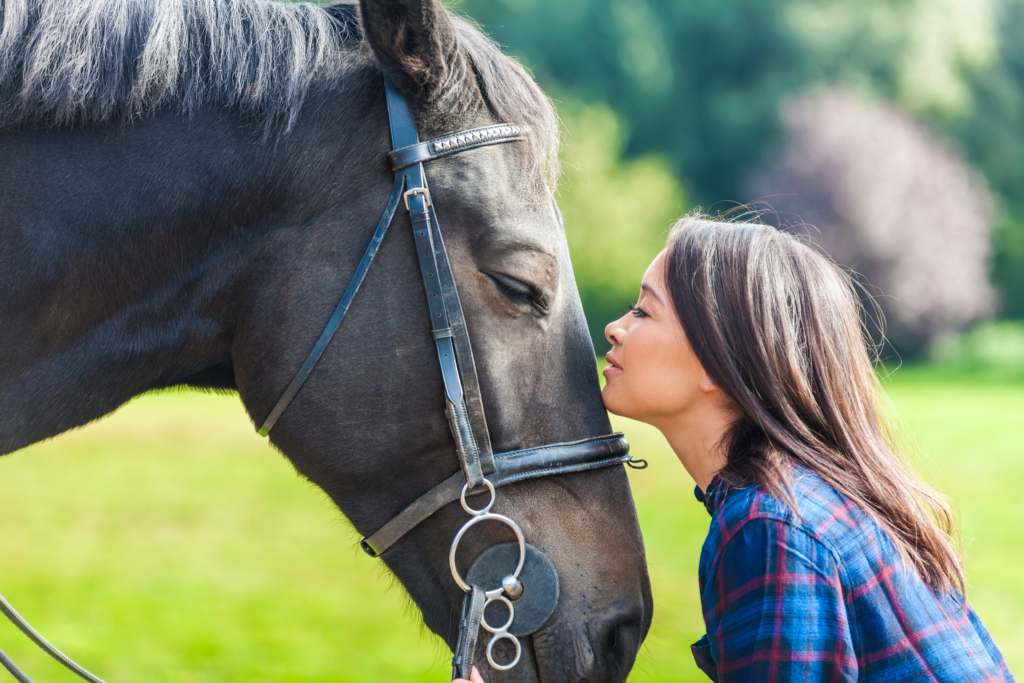
EAMH Clinical Program Rates & Sponsorship
With a Licensed Mental Health Professional
With An Unlicensed Mental Health Professional
(Masters or Doctoral Level Student or Postgraduate Associate, Under Clinical Supervision by a Licensed Mental Health Professional)
If you would like to donate or sponsor, one-time or recurring, a therapy horse, Individual or Couples’ package, or specialized Group program (i.e. At-risk youth, First Responders and EMTs, Seeking Safety women’s trauma recovery group, and/or veterans groups), please Contact Us or Donate Today!
